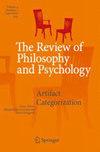神经性厌食症的身体检查:从询问到习惯
IF 1.8
Q2 PSYCHOLOGY, MULTIDISCIPLINARY
引用次数: 1
摘要
身体检查,其特征是对自己身体的特定部位(如大腿、腰部或上臂)进行反复的视觉或身体检查,是与饮食失调,特别是神经性厌食症(AN)相关的最突出的行为之一。在本文中,我们探讨了AN的顽固性恐惧模型(RFM)在身体检查方面的解释潜力。我们认为,当RFM与某些关于情绪认知和认知作用的貌似合理的辅助假设相结合时,能够解释身体检查的关键特征,包括身体检查行为如何成为习惯性和强迫性的。本文章由计算机程序翻译,如有差异,请以英文原文为准。

Body Checking in Anorexia Nervosa: from Inquiry to Habit
Abstract Body checking, characterized by the repeated visual or physical inspection of particular parts of one’s own body (e.g. thighs, waist, or upper arms) is one of the most prominent behaviors associated with eating disorders, particularly Anorexia Nervosa (AN). In this paper, we explore the explanatory potential of the Recalcitrant Fear Model of AN (RFM) in relation to body checking. We argue that RFM, when combined with certain plausible auxiliary hypotheses about the cognitive and epistemic roles of emotions, is able to explain key characteristics of body checking, including how body checking behavior becomes habitual and compulsive.
求助全文
通过发布文献求助,成功后即可免费获取论文全文。
去求助
来源期刊

Review of Philosophy and Psychology
PSYCHOLOGY, MULTIDISCIPLINARY-
CiteScore
4.70
自引率
5.00%
发文量
60
期刊介绍:
The Review of Philosophy and Psychology is a peer-reviewed journal focusing on philosophical and foundational issues in cognitive science.
The aim of the journal is to provide a forum for discussion on topics of mutual interest to philosophers and psychologists and to foster interdisciplinary research at the crossroads of philosophy and the sciences of the mind, including the neural, behavioural and social sciences.
The journal publishes theoretical works grounded in empirical research as well as empirical articles on issues of philosophical relevance. It includes thematic issues featuring invited contributions from leading authors together with articles answering a call for papers.
The Review of Philosophy and Psychology is published quarterly and is hosted at the Jean Nicod Institute, a research centre of the French Centre National de la Recherche Scientifique. It was formerly published as the "European Review of Philosophy" by CSLI Publications, Stanford.
 求助内容:
求助内容: 应助结果提醒方式:
应助结果提醒方式:


